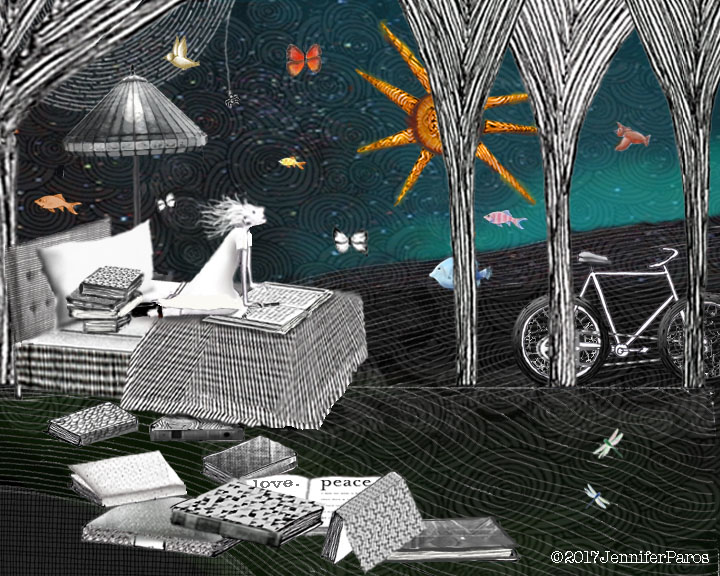The Deeper State, Tell Me a True Story
by Jennifer Paros
April 2017
Deep in their roots, all flowers keep the light.
~ Theodore Roethke
Recently in the news, the phrase Deep State has gotten traction. It refers to a shadow structure in the government operating on its own, outside of the law. The Deep State implies an unseen criminal network attempting to undermine us. My problem with a Deep State – whether or not it exists – is that as a construct alone it creates fear. Right now in American society we have strong competing narratives of opposing realities and both, according to the other, include conspiracy. When we enter the realm of conspiracy, though we may think we’re now alert to the dangerous unseen, we actually obstruct our own clarity. We lose sight of what is happening presently and what is known deeper within us – truths bonded to the reality of our inextricable connection to each other and to the good in life.
In 1969, Fred Rogers defended PBS to the US Senate when President Nixon wanted to cut its 20 million dollar budget in half. In footage of his presentation, he speaks of how much he cared about children and in doing so shed light on the greater good at stake. He presented a more authentic story than that of any politics or policy. In his open and genuine way, Fred Rogers offered a true story about meaning and love. His argument was compelling because his awareness of something deeper transformed the conversation. In his defense of what was true in the deepest sense, the unreal fell aside and his argument was welcomed.
Differing “realities” demand we use other resources to evaluate them besides testimonials to those realities. We don’t have to choose a side and follow. Opportunity lies in using our minds to assess ideas from a grounding in who we are at our core and who we want to be. Suspicion and mistrust cannot guide an effort for clarity; they create too much distress. Though mistrust may initially alert us, if we connect to a larger process of understanding and learning in which we can trust, that will assist us. We are consumers of stories; we are also deciders of what will consume us.
Three things cannot be long hidden: the sun, the moon, and the truth.
~ Buddha
In 2014, after the Euromaidan protests in which activists came out in favor of advancing Ukraine’s integration with the European Union, Ukrainian media was flooded with Russian propaganda. At the Kyiv-Mohyla Academy in Kiev, a media organization formed called StopFake. They worked to debunk fake news and teach individuals how to assess and check information for themselves. Over time, StopFake’s efforts helped reduce viewership of these propaganda media sources to only 8 percent of the population. People started actively reflecting on and seeking what was true. StopFake helped redirect Ukrainians’ attention back to themselves – back to independent thought and trust in self, and a more active and deliberate use of their focus.
When we are balanced from within, it’s not difficult to recognize storytelling that is out of whack or trying to sell us something. Whether the story of a healthcare bill is said to have a “disastrous” or “fabulous” ending, we’re being sold a perspective. But we’re not in need of ready-made conclusions; we need to come to our own conclusions in order to retain our autonomy of thought and involvement. We must participate to know ourselves, just as we must use our arms to experience their strength. If the writer doesn’t allow that participation, then his agenda is being pushed, not expressed, and the story suffers from inauthenticity. A real story doesn’t need to be protected; it’s not threatened by its readers’ independent thought, only made more expansive by it.
In Fred Roger’s appeal to the Senate he said, “For fifteen years I have tried . . . to present what I feel is a meaningful expression of care.” Regardless of what story is being told or sold, we can all receive and offer this expression of care. When we turn towards a sense of connection and meaning, it then becomes our guide. This guidance will highlight the authentic and, by contrast, make obvious the inauthentic. Within us is a compassion and intelligence we can trust that holds value for the individual and the world. If there is an actual Deep State, it’s a deep network of kindness, not a spy-based, enemy-driven force trying to take us down. A true Deep State is one pulling for us, rooting for us all – a love and unity that will serve us better than any story or system can.
Jennifer Paros is a writer, illustrator, and author of Violet Bing and the Grand House (Viking, 2007). She lives in Seattle. Please visit her website at www.jenniferparos.com.

